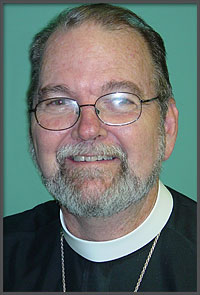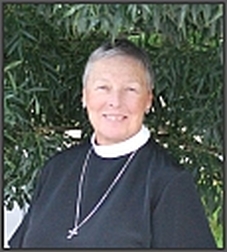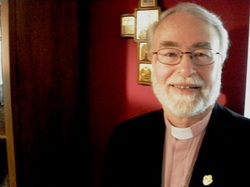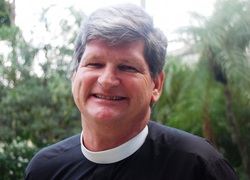 Day 54 – Numbers 15 -17; Psalm 45; Luke 3
“The voice of one crying out in the wilderness: ‘Prepare the way of the Lord, make his paths straight…’”
In today’s readings we read the ministry of Moses and John [the Baptist], two of our greatest prophets. If Waylon Jennings were to comment he might have written, “Mammas, don’t let your babies grow up to be – Prophets”
Moses is under constant criticism for passing God’s Word to the people and John loses his head for being the “The voice of one crying out in the wilderness!” Moses is doubted by some of the people wanting to question his ‘lording influence over the people.’ Most often in Prophetic history the prophet is rejected or severely put to the test, never fully accepted in her/ his own time. In last Sunday’s Gospel reading Jesus himself said, “Jerusalem, Jerusalem, the city that kills the prophets and stones those who are sent to it!”
Luke’s Gospel follows a simple theme: Past – Present – Future. Unlike Matthew and Mark, Luke’s work is addressed to a broader audience of the Christian movement. He is writing to a mix of Gentile and Jewish readers. Unlike Mark which is more spoken and sermon-like, Luke writes with the detail of a novel. Luke is making the case [is it to Theophilus - “Lover of God” ?] for this Christian Movement. But he must be careful not to disconnect this phase of God’s work with the past -- with the work and ‘Word” of the God of Israel. So as Luke introduces a new prophet, John, he must connect John’s prophecy to the past and introduces his ministry in the words of an earlier prophet, Isaiah; “The Voice of one crying out…”
Luke applies this Past – Present – and Future theme to Promise [The promises of the past], Fulfillment [conversion and fulfillment in the present] and Mission [the mission and action of the future]. The promises made to God’s people of the past must be maintained in this new or unfolding phase of God’s revelation. So, Luke uses John, an Old Testament model of Prophecy to make the transition between Past and Present. “Offspring of Vipers… produce therefore deeds appropriate to conversion.” By ‘conversion’ John means, Change of life – renewal – past to present – promise to fulfillment. Yet, even the temporary fulfillment experienced in this act of conversion, this act of repentance and turning is only the beginning. It requires action! The people coming out to John ask, “What, then, should we do?” John answers, “The person who has two tunics should share with the one who has none. The person who has food should do the same.” In this process, the people are called to action – mission!
With the Moses model in mind, the people wonder inwardly whether John is the Messiah. “Are you one like the past here in the present?” John answers, “I am baptizing you with water. But the one stronger than me is coming.” As the Psalmist reminds us in today’s Psalm, John is telling the people: “I will cause your name [God’s Name] to be celebrated in all generations, therefore the peoples will praise you forever and ever.” John’s work, like that of all the prophets, draws the people into relationship with God. John’s work is ‘preparing the way for Jesus,’ God in our midst!
Almighty God, we give you thanks for your steadfast love in sending the Prophets of the past, for those in our midst, and for those you will continue to send us in the future. Help us to hear, be guided by them all, and moved to the mission you set before us.
The Ven. Thomas A. Bruttell
Archdeacon for Transitional Ministry
Diocese of Southeast Florida
 Numbers 12-14; Psalm 44; Luke 2
So the Israelites were almost to the Promised Land. They’d been both faithful and crabby. God was actually very reasonable when they protested and yet had clear boundaries they frequently crossed and they were given major consequences. Moses knew, though, to go straight to God with any complaints and saw that God would not only be reasonable but would come up with solid solutions. He even gave Moses seventy elders to help him so it wasn’t all on his shoulders all the time. But Moses knew to ask God.
Miriam and Aaron must not have gotten the memo. Today we see them murmuring, “What about us? Doesn’t the Lord speak through us too?” And the Lord overhears them and says, “Well, no, not exactly like I do with Moses.” Basically, he told them to recognize Moses as this holy man with whom he speaks face to face. And the anger of the Lord was kindled. He punishes Miriam by making her leprous for a week. (Not sure why Aaron gets off scot free.)
When the people finally get to the edge of the Promised Land and the scouts that had been sent report back, again, most of them murmur and allow fear to overtake them. They didn’t trust God so they would now have to wander for forty years and not be able to enter the Promised Land at all. Seems really harsh. Makes us want to “run to the gospel” as one of my seminary professors used to say.
We cry with the psalmist, “Come on, Lord! Come on!”
And then the Messiah comes. Takes a few centuries, but the Messiah comes and the Promised Land is now available everywhere. I wonder how much we’ve learned since the days of the Israelites’ journeying. We too can be both faithful and yet crabby at times. Perhaps we can learn to go straight to God with our complaining instead of murmuring to one another. Perhaps we can then listen to our Lord as even the elders did in the temple. Perhaps. Thanks be to God we have a power so much greater than ourselves for guidance and direction, hope and light.
The Rev. Wendy Tobias
Associate Priest, St. Joseph's, Boynton Beach
 Wednesday, February 27, 2013 or Day 52
Numbers 9-11, Psalm 43, Luke 1
In the middle of the long lists of Numbers, after paragraphs which say the exact same thing with the exception of the name of the tribe, the story of Moses and the people comes back in beauty and hope. God tells Moses that they need to remember the story of the Passover and to keep the feast.
How was the message given to the people? We are not sure, but it was done in such a way that those who were unclean because they had touched a corpse thought they might not be able to keep it. Moses brought their question to God who invited them in. It brought tears to my eyes!
The next bit shows clearly that the text has been redacted in later days as it addresses those who are away on a journey (they are ALL on the journey together with God). But none the less, those traveling, and resident aliens are to celebrate too. “[Y]ou shall have one statute for both the resident alien and the native.” (Num 9:14b)
As we started the Gospel of Luke today we came upon some of the most well beloved poetry in the New Testament. The Song of Mary or the Magnificat is said and sung in our churches regularly, especially at Evening Prayer. In it we hear of God’s reversal of the normal state of things. The looked with favor on the lowly, he has scattered the proud; he has lifted up the lowly!
May the God who includes those often left out and lifts up those who are often downtrodden bless you this day!
The Rev. Cori Olson
Priest-in-Charge, St. Luke the Physician, Miami
 Reflection Day 51
Numbers 6-8; Psalm 42; Mark 16
A LITTLE BIT ABOUT THE PRIESTLY BLESSING
“The Lord bless you and keep you;
The Lord make his face to shine upon
You; and be gracious to you;
The Lord lift up his countenance upon
You, and give you peace.” (Num 6:24-26)
The Priestly Blessing is, at least for me, one of the most beautiful blessings imaginable. It is among the oldest blessing in continuous liturgical use, and is used today by both Christians and Jews, and at more secular events such as the presidential inauguration. Archeologists discovered the words of this blessing, given to Aaron and his sons by God, in 1979 etched on silver scrolls in tombs from the seventh century B.C. The tombs were buried beneath the Scottish Church of St. Andrew’s in Jerusalem.
Traditionally, from the time of the Exodus from Egypt through the conquering of the land of Canaan, the priests blessed the people every morning after the sacrifice at the mishkan, the portable dwelling place for the divine presence. This act of blessing continued in the Temple. Today, Sephardic synagogues end their service with this blessing as a benediction; Ashkenaz only recite it on certain holy days. When performing the Priestly Blessing the Priests stretch their arms and hands forward. They hold their hands together, palms-down and split their fingers so that there are five spaces: one space between the thumbs, a space between the thumb and the first finger of each hand, and a space between the second and third finger of each hand.
It is believed that the five spaces allude to verses in the Song of Solomon (2.8-9) – “Listen! My beloved! Look! Here he comes, leaping across the mountains, bounding over the hills. My beloved is like a gazelle or a young stag. Look! There he stands behind our wall, gazing through the windows, peering through the lattice.”
The Talmud says that before the Priest blesses the congregation they (the priests) must make a blessing in which praise is given to the Lord for the honor of blessing the people. This blessing is called, “to bless His nation Israel with love”.
The phrase “with love” is integral to the act of blessing the people; just as God blesses us as an expression of His kindness, so too the priests must seek to display God’s love through their blessing.
The text of the Priestly Blessing has three parts, and is therefore called “the three in one blessing.” It is written in the singular rather than the plural because it is meant to have personal application, not to be a general benediction over a crowd of people.
In the Old Testament, the word "bless" means to confer well-being or prosperity. However, the promise of such blessings was conditional - Deut 28:1-6. Failure to meet God's conditions brought curses, not blessings - Deut 28:15-19
The word "keep" means to provide and care, to guard and protect - like a shepherd guarding and providing his sheep. The blessing calls upon God to keep watch over Israel
To "make His face shine" suggests God's smile of favor on His people, evidenced by His being "gracious" - Ps 31:16; 80:3; Dan 9:17
To "lift up His countenance" suggests pleasure and affection; approval and recognition.
The word "peace" is not just the absence of war, but a positive state of rightness and fullness of well-being.
In today’s world…
“The Lord bless you and keep you" Today, our blessings come through the Good News of Jesus Christ - Ep 1:3 and as described by Jesus in Mt 6:25-32. However, this blessing remains conditional - Mt 6:33.
"The Lord make his face to shine upon you, and be gracious to you" Just as all spiritual blessings come through Jesus, so God's grace is now manifested through His Son - Jn 1:17
"TheLord lift up his countenance upon you, and give you peace". Through Christ, peace with God is now possible - Ro 5:1. And as we continue to pray, God bestows peace through His Son- Php 4:6-7
The God of the Old Testament remained hidden from his people. No one was allowed to see His face. The God of the Old Testament “peeked” through the hands of the priests to see the needs of His people. Only a select few were given the authority to convey His blessings upon those whom He had chosen.
The God of the New Testament, no longer hidden, is fully with us. He has shown us His face. He has lived among us to be with us and to heal us – to show us the way; the light. He has given to all of us, through our baptismal covenant, the authority to bestow this unspeakably glorious gift of Good News to all nations through our life in Christ.
Yet, despite His immediate presence among us, to the very end Jesus’ disciples refused to believe in the gift they had been given. Mark’s Gospel has Jesus appearing to Mary and to his disciples a total of three times after his resurrection before he is finally taken up into heaven by the Father. After Jesus’ ascension, still dazed, the disciples remained unclear as to what direction they should take.
Think of the persistence, courage, passion and compassion of Christ in bringing the hidden face of God the Father to us. Think of the blessing that we have received, and continue to receive from God the Father. Think of the blessing that we have been commissioned, through our baptism in Christ, to bring to the world.
Will we through thought, word, and deed give life to the Priestly Blessing? Will we, through the compassion and grace we have received from His being among us and with us always, personify with love and humility the words of this incredibly powerful blessing to those whom we seek to heal?
The Rev. Deacon Clelia P. Garrity, St. Paul’s Episcopal Church, Delray Beach
 Numbers 4-5, Psalm 41, Mark 15
Mark's Gospel has always been my favorite, so I concentrate on it today. There is such accelerated energy throughout it. It's as if Mark is so excited to tell the story that the words cannot come out of his mouth fast enough. It's like one run-on sentence connected by "and then," "immediately," and "at once." This energy comes alive in a performance of the Gospel done by Max McLean, produced by the Fellowship of the Performing Arts. To understand my emphasis today, I encourage you to experience this energetic presentation of Mark 15 (and links to the rest of Mark's Gospel) at:
http://www.youtube.com/watch?v=OF8XvmyWxjo&list=UUBz5uJ-Bz7hrMV5M12Mqh7g&index=2
As we come to the completion of Jesus' mission in Mark 15 today, the accelerated way in which Mark shares the story with us continues -- except at one point. The time at which Pilate decides to release Barabbas instead of Jesus, there is a slowing down of the action, a tragedic pause in the Shakespearean sense, where the character (Pilate), with a potential for greatness, chooses the easy way out, and thereby goes down in history with the King Lears, MacBeths, and Hamlets of the world. They all had a potential for greatness, but their hubris, their excessive pride, gave them not only pause, but in the end prevented them from making the heroic decisions they could have made.
For me, it links so well with another potential hero that we heard about in church yesterday from Luke 13. Jesus is now the one who pauses. After he has set his face towards Jerusalem, now he overlooks that city and weeps, full knowing that the heroic choice that he is making, will not be made by many others.
We all have our moments of pause before the metaphorical angry crowds or Jerusalems before us. We stare straight into the face of the obstacles, painful confrontations that we must have with ourselves, our God, and with each other, the "speaking the truth in love" that we have put off for far too long, even the addictive behaviors that chain us before that crowd and that hillside. Yet the only way we will find the freedom of becoming our true selves is to ignore the crowd, journey from the hillside down the valley and into the city. Whatever that angry crowd or Jerusalem represents in your life today, I beg you to make a heroic choice. It is the only way we will be able to echo the psalmist's words, "You have upheld me because of my integrity, and set me in your presence forever" (Psalm 41: 12).
The Rev. Marty Zlatic
Rector, St. Joseph’s Episcopal Church, Boynton Beach
 “I Am”
Meditation for Day 48: Mark 14
Bryan A. Hobbs
Chapter 14 of Mark’s Gospel takes way more than one day for adequate meditation and reflection. This chapter along with the 15th chapter is the very heart of the Good News of Jesus Christ, so much so that it is often simply referred to as Christ’s “Passion”.
Of the many themes presented, there is one that I wish to focus upon today and that is Jesus’ answer to the High Priest’s question, “Are you the Messiah, the son of the Blessed God?” (Mk. 14:61b) Jesus replies, “I am…” and in so doing condemns himself to death. When Jesus uses the same phrase or name that God gave to Moses in Exodus 3:14, “I AM”, he is in essence declaring that he is God, a declaration that we readily accept as true since we stand on the other side of the Resurrection. But to the High Priest, Jesus was declaring himself to be God which was a total abomination to any Jew. When Jesus chooses to use the term “I AM”, he has chosen the Cross as his future and in turn changed the course of all human history.
So, let’s think about the turning points in our lives when we made decisions that impacted the future course of our history and in many cases that of our families as well. I chose to marry Annabel on June 1, 1968. That changed the course of our lives and that of our two children. If we had chosen otherwise, my grandchildren would not be. I chose to respond to the call to be ordained and the church agreed. So, on June 1, 1975, I was ordained at St. Paul’s Church, Key West. Our lives often revolve around making large and small decisions that often have a dramatic impact on God’s Kingdom…mostly for the betterment of all.
The Rev. John Newton, Anglican priest, wrote the most memorable hymn in 1773 – “Amazing Grace”. This one hymn is probably sung more often than any other hymn, modern or ancient, so often that most of us know the words by heart and readily sense the presence of the Holy Spirit as the first cords are struck. But, John Newton’s greatest accomplishment is not found in “Amazing Grace”, great as the hymn may be, but rather the significant role he played in the English abolitionist movement. An essential part of that movement was John Newton’s prayerful and successful attempts to share the Gospel with a newly elected Member of Parliament, William Wilberforce. William Wilberforce struggled mightily in 1785-86 with remaining in Parliament or following his call to the Church. On Easter Day, 1786, William Wilberforce, with the strong counsel of John Newton, made a decision to stay in Parliament as a faithful Christian, a decision that was destined to change the course of human history.
John Newton and William Wilberforce were two of the most influential persons in bringing to light the ravages of the English Slave Trade and of slavery itself. John Newton wrote of his exploits as a captain of a slave trade in a pamphlet published in 1788 “Thoughts Upon the African Slave Trade” where he recounted his personal experiences in the slave trade from 1750-1754. Newton documented the unspeakable horrors of the slave trade and the “civilized” nature of what had been referred to as the African “savages.”
William Wilberforce introduced legislation beginning in 1878…then more legislation to follow…then even more legislation. This was an impossible…impossible…impossible…legislative task only made possible by God’s grace along John and William’s daily determination to follow Christ. Finally, on March 25, 1807, the Slave Trade Act was enacted and on July 26, 1833, just three days before William Wilberforce died, the Slavery Abolition Act was passed. It is no wonder that today, February 23rd, we celebrate the life, work and faith of William Wilberforce in the Episcopal Church, a decision from which we all benefit.
 Day 47, (No Old Testament reading today), Psalm 39, and Mark 13
Whew, we’ve made it through Leviticus! All those commandments we fight over and the ones we’ve never heard of before are behind us and for today, we’re taking a rest from the Old Testament. Tomorrow we’ll start taking up the Book of Numbers, but as Jesus told us back in Matthew, "So do not worry about tomorrow, for tomorrow will bring worries of its own. Today's trouble is enough for today. (Mat 6:34 NRS)
And today does indeed have enough trouble. Questions about the end of things come up for Jesus and his disciples. Like so many of us, the disciples start talking about the security of their world. Though I can’t imagine anyone saying these exact words, the sentiment is familiar. We do not have to worry, look at our might! We may be invaded, but look at our temple! We will win!
But Jesus says something else. Don’t put your faith in these temporal things, this building will soon be gone. That temple was in fact destroyed by the Romans in the year 70 CE (common era or AD).
But what about the rest of it? “Truly I tell you, this generation will not pass away until all these things have taken place.” (Mk 13:30) Does this just mean the temple or was it supposed to mean the whole thing? As far as I have been able to tell, every generation from the time of Jesus until today has had someone saying, “The end is near!” And yet, here we sit.
Perhaps the real message is this, we don’t know the time, so the time to be about the business of God is now! We may or may not have tomorrow. Or as Hush Puppy says in Beasts of the Southern Wild, "For the animals that didn't have a Dad to put 'em in the boat, the end of the world already happened."
Today is the day to be about the work of God!The Rev. Cori Olson, Priest in Charge, St. Luke the Physician, Miami, FL
The Rev. Cori Olson, Priest in Charge, St. Luke the Physician, Miami, FL
 The Bible Challenge
Day 46 Reflection
Leviticus 25-27, Psalm 38, Mark 12
The Rev. Mark Andrew Jones, BSG
Congratulations! As of today, you’ve finished another book of the Bible, Leviticus – no small feat. And, in its closing segments, we are reminded that we are but stewards. We may enter and possess the land, and we may lease it; but in the 49th or 50th year (scholars disagree), it reverts back. The inheritance of God’s people is returned and preserved. Also, the debts of indentured laborers are abolished in the year of the Lord’s Jubilee; for God’s people are to be free.
Sadly, there is no evidence that Israel ever actually practiced the year of
the Jubilee. If one examines human history, it is clear that the Ancient
Israelites were not alone in being like the wicked tenants of Jesus’
parable. Indeed, human experience has given rise to a familiar
maxim: “Possession is nine-tenths of the law.” And so we justify
excluding, denying, and even killing so “the inheritance will be ours.”
The year of the Lord’s Jubilee also meant something else. It provided a free
chance to start over, to start fresh. One seldom buys oneself out of debt
or wage slavery. This is as true on the international scene in the case of
indebted Third World and Developing Nations as it can be true in the case of
individual workers. Will the Developed and Industrialized Nations of the
world, which consume a disproportionate share of the global economy’s goods and
services (and exercise inordinate influence over the world’s resources), accede
to calls for an International Debt Jubilee. Will we?
“You shall love the Lord your God with all your heart, and with all your soul, and all your
mind, and with all your strength” and “you shall love your neighbor as
yourself.”
Jubilee – perhaps this should form the core of our Lenten
meditations.
“Do not forsake me, O Lord; O my God, do not be far from me;
make haste to help me, O Lord, my salvation” Psalm 38:21-22.
 Day 45 Wednesday, February 20, 2013
Leviticus 22-24, Psalm
37:19-42, Mark 11
I have been dreading these Leviticus days…. How about
you? What insights have you gained from this intricate series of ancient practices, and what the Oxford Bible commentators have called, “a remarkably coherent system of ritual and theology”? A view from 30,000 feet – is a good way to consider this book about the priests of the tribe of Levi. From a bird’s eye view we can see the book of Leviticus in the middle of the Torah – the first five books of the scripture. From that
vantage point we can see how the ‘worship practices officiated by the high
priest Aaron and his descendants’ fit between the beginning days in Genesis and
movement of the people of God in Exodus and, the coming accounting in Numbers
and accountability of Deuteronomy. One of the great benefits of reading
the Bible mostly in order is that we begin to see the wider arc of divine
instruction. As the days’ readings grow more complicated it is helpful
to seek a few scholarly resources that will help us to understand the ‘larger
internal logic’ of the books we are reading. So my quotes today are all
from The New Oxford Annotated Bible, Fully Revised Fourth Edition in the New
Revised Standard Version With The Apocrypha: An Ecumenical Study Bible.
The Oxford is a study bible, with great footnotes, maps and a commentary at the
beginning of each chapter. Do you have a study bible to work with?
We are in the chapters of Leviticus that the Oxford commentators say
straddle two sections of the Holiness code; we are between the priestly and
sacrificial rules (chapters 21 and 22) and the rules governing the calendar
(23:1-24:9 and 25:1-26.2). It seems to me that even in these most ancient
of days, the people of God were trying to figure out who was ‘in’ and who was
‘out’ of God’s favor. Not our job then, or now. It seems to me that
even in these most ancient of days, the people of God were trying to prioritize
their calendars…What is our divine instruction today? How do we
prioritize our calendars with God’s calendar? Good questions for Lent, I
think.
The Very Rev. Kathleen Gannon
Curate, St. Paul’s Episcopal
Church, Delray Beach, FL
Dean, South Palm Beach Deanery in the Diocese of
Southeast Florida
 The Diocese of Southeast Florida Bible Challenge
Day 44 - Leviticus 19-21,
Psalm 37:1-18, Mark 10
“The devil is in the details,” the old expression goes. Well
in this instance, “God is in the details.” The Book of Leviticus makes it abundantly clear that God cares about every aspect of life. For faithful Jews, keeping the Law, all of the Law, is a grace, because it allows them to see and understand God in every aspect of life. The chapters from Leviticus assigned for today are from a section of the book commonly known as “the holiness code.” The sum and substance of this entire section is captured
in Leviticus 20:26, “You shall be holy to me; for I the Lord am holy, and I have
separated you from the other peoples to be mine.” As one source notes, much of
the material was written “as protests against the practices of other people”
(e.g. witchcraft and magic - See footnote to 19:26-31 in The Oxford Annotated
Bible NRSV – Third Edition). Throughout chapters 19 and 20, there are
clear restatements of the Ten Commandments. These are amplified and expanded
into new laws to adjust to specific situations and cases that had clearly
occurred within the community of the people Israel. Within the section of
the Holiness Code assigned for today are several verses that are particularly
noteworthy. Leviticus 19:9 instructs the people not to harvest their
entire crop but to leave “gleanings” for the poor and the alien. This
indicates that the condition of the poor and the alien was to be a matter of
concern for all the people and that all the people were to offer a meaningful
response. Leviticus 19:18 contains the verse that Jesus used as part
of his “summary of the Law,” You shall love your neighbor as yourself (See
Mark 12:31). And Leviticus 19:33 – 34 should give us all pause given the
current arguments about immigration and immigration reform. It reads,
“When an alien resides with you in your land, you shall not oppress the alien.
The alien who resides with you shall be to you as the citizen among you; you
shall love the alien as yourself, for you were aliens in the land of Egypt: I am
the Lord your God.”
Psalm 37 is a wisdom psalm that addresses the age-old conundrum, why do the
wicked seem to prosper? The answer of the psalmist? Don’t worry,
they’ll get what’s coming to them eventually. This may not seem especially
helpful or comforting to some, but it is the traditional biblical answer, and
the truth of the matter is, it is often so. Think, for example, of Saddam
Hussein or Hosni Mubarak.
Today’s assigned reading from Mark 10 offers an interesting contrast to the
Leviticus reading. The chapter contains a variety of vignettes. To
begin with, Jesus finds himself in controversy with some Pharisees over the
question of divorce. Jesus’s standard for divorce is higher than that
offered by the Pharisees, who argue that Moses allowed a man to write “a
certificate of dismissal” and to divorce his wife. This was a very low
standard. All a man had to do was to hand his wife a note that said, “You
are no longer my wife, I am no longer your husband.” That was it, they
were divorced. Jesus said it was for their “hardness of heart” that
Moses allowed this. He quotes Genesis in order to indicate God’s divine
intention for marriage from the beginning of creation. Today, many believe
that Jesus’ teaching was radical for its day because it protected women who were
often victims in divorce (a woman under Jewish Law did not have the right to
divorce her husband). As is often the case in Mark’s Gospel, Jesus
goes inside with his disciples to further clarify the teaching. ‘Whoever
divorces his wife and marries another commits adultery against her; and if she
divorces her husband and marries another, she commits adultery.’ Many believe
this saying reflects Roman law at the time Mark’s Gospel was being written,
since, again, under Jewish Law, a woman could not divorce her husband, but under
Roman law she could. Also in chapter 10 is a fascinating exchange between
Jesus and a rich man (Matthew describes him as “young,” Luke says he is a
“ruler”). The rich man kneels before Jesus and asks, “Teacher, what must I
do to inherit eternal life? Jesus lists some of the commandments, the last
six to be specific, “You shall not murder; You shall not commit adultery; You
shall not steal; You shall not bear false witness; You shall not defraud; Honour
your father and mother.” The rich man answers him, ‘Teacher, I have
kept all these since my youth.’ Jesus, looking at him, loved him and said, ‘You
lack one thing; go, sell what you own, and give the money to the poor, and you
will have treasure in heaven; then come, follow me.’ When he heard this, he was
shocked and went away grieving, for he had many possessions.” It is
important to note that when Jesus listed some of the commandments, he left off
the first four about love of God and not worshiping false idols. If Jesus
had included these in his list, the rich man would never have been able to
respond “I have kept all of these from my birth.” His wealth was his
idol. When Jesus instructed him to sell it, he could not. Needless
to say, this begs the question of each of us, what do we hang on to as our idols
today that prevent us from inheriting the kingdom of God?
The Rev. Canon Canon William H. "Chip" Stokes,
Rector, St. Paul's, Delray
|










 RSS Feed
RSS Feed